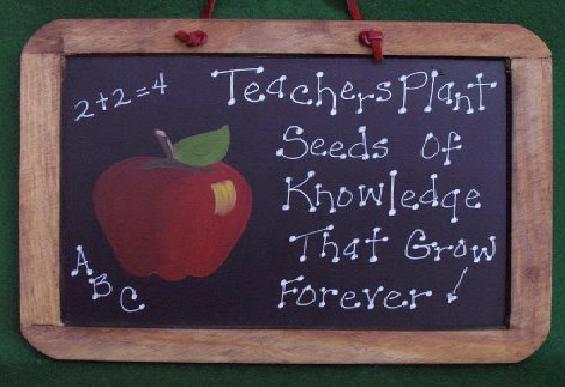|
Our Twenty Commandments Of Teaching - Teaching Tips for Every DayTeaching tips are crucial for success and life becomes easier when you have experts to consult with and that's what this page is all about. Below are the 20 commandments of teaching from the "teachers of teachers" on my MAT program - Dr Brian Mumma and Dr Cynthia Alby. Thanks a million guys. You are amazing at what you do!

1. Focus on Your Four Main Goals(This is probably my favorite teaching tip.) Help students learn as much as humanly possible, develop a life-long love of learning, be ethical individuals, and believe in themselves.
2. Do Whatever You Can to Make What Happens in Your Classroom MagicalWhen you can’t achieve magical, at least shoot for intriguing, lively, or meaningful. Learning is inherently exciting; don’t suck the enjoyment out of it. Fight fiercely to hold on to students’ attention. 3. Make Sure Everything You Do Connects Very Clearly to Your Learning GoalsDon’t sacrifice deep learning for “fun” or ask students to engage in activities that aren’t going to lead to significant learning. (It is OK to go off track sometimes, but make sure something important is coming out of that.) Stay focused and remember that less is more. 4. Get Students DOING ThingsSuch as collecting and analyzing data, devising and carrying out experiments, making and testing hypotheses, teaching one another, making connections, developing metaphors, creating, thinking, critiquing, questioning, wondering, designing, acting, debating. Teaching by telling is only occasionally the best possible method, so use it judiciously. ("Doing" is one of the best teaching tips that works.........) 5. Be Passionate and Enthusiastic Every DayMake sure you’ve found something to love about what you are teaching that day, and make sure the students see why they should love it too. 6. Help Students ReflectHelp them reflect on their own strengths and weaknesses, successes and failures. Help them cherish their failures and set worthy goals for the future. 7. Be SpecificGive specific, useful, timely feedback that will help students grow. (That's what they are there for - a great teaching tip). 8. Make ConnectionsLearning is making connections; what doesn’t connect, doesn’t stick. So become knowledgeable about youth culture in general and your students in particular and use that knowledge to help students make those connections that are so vital. Your primary job as a teacher is to help students make connections between what they already know and what they are learning. Also look for connections between what they are learning in your class and what they are learning in other classes. 9. Praise, Praise, Praise, Praise, Praise.Make sure the praise is specific and heartfelt. 10. Limit HomeworkMake sure the homework you do assign meets the standards for a worthwhile homework assignment. 11. Be Able to Answer The $100,000 QuestionsWho learned what? How do I know? Why should we learn this stuff?
12. Don’t Recreate The WheelSpend as much time as you can talking to others, combing the internet, reading everything you can get your hands on, and attending workshops and conferences. 13. Don’t Neglect Any Part of A UnitThings like soliciting prior knowledge and ending with a strong review are key components that can’t be sacrificed. 14. Create A High Expectations/High Support EnvironmentThere is no point asking a lot of students if you aren’t going to give them loads of support in achieving those lofty goals. The old adage is true: expect excellence and you’ll get excellence; expect failure and you’ll get failure. 15. Find Ways to Empower Students.Teach them study skills, metacognitive strategies, and cultural capital. Ask for their opinions and involve them in decision-making. Go ahead and give up a little class time in order to build community. 16. Incorporate Strategies That Are Naturally Motivating:Storytelling, creating something new, expressing oneself, thinking about life’s big questions, answering questions they’ve posed themselves, helping others, having choices, engaging in authentic experiences, learning information that will improve their lives right now, discovering things that reflect their own history and culture, learning about how various subjects relate to one another. 17. AskAsk great questions and help students learn to ask great questions. 18. Teach EverythingTeach reading, writing, listening, speaking, math, and computing in every class. These aren’t just the job of the English or math teachers but of every teacher. 19. Relationships Are KeySpend the time necessary to get to know each and every one of your students. Keep files and review those files. Listen. Don’t try to be their friend. They have plenty of friends. Be their mentor; be a model. Feel free to be a little odd because students need to see that they don’t have to fit a certain mold. Tell them appropriate stories about yourself. (The key to this teaching tip is the word "appropriate" - be appropriate in relationships) 20. Learn YourselfKnow who you are as that will influence your teaching skills and limitations. Show yourself as a life-long learner.
|